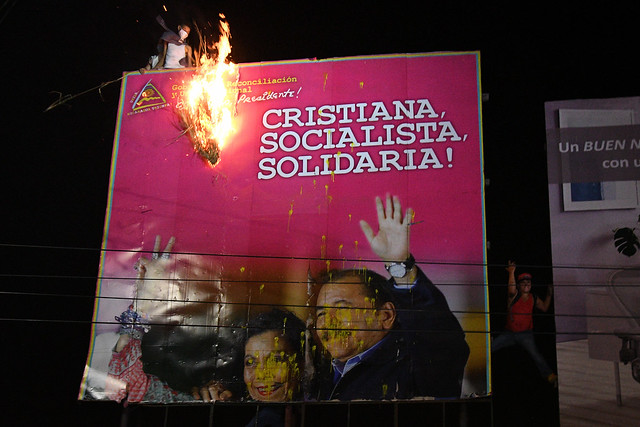26 de febrero 2020

The Return of the Military

PUBLICIDAD 1M
PUBLICIDAD 4D
PUBLICIDAD 5D
In Nicaragua, the Ortega administration is facing significant economic and political challenges that would lead to a resurgence of widespread protests

Daniel Ortega's model in Nicaragua has nothing of socialism
The situation in Nicaragua continues to deteriorate. The economy has contracted by nearly 10 percent over the past two years and the IMF forecasts it will contract again this year, although at a more moderate rate. Unemployment has risen to about 10 percent and nearly 100,000 people have fled the country in the past 12 months. Significantly, foreign direct investment has fallen by approximately 50 percent, mainly in the tourism industry.
Dependent on foreign investment to stimulate growth, Nicaragua’s economy, one of the smallest in Latin America, will remain stagnant until the political situation changes. The coming year will also be important because of the lead-up to the 2021 elections, which means that the regime of President Daniel Ortega must find some way to legitimize its grasp on power and, on the other hand, that the opposition must hold together and maintain its legitimacy.
After the outbreak of civil protest in April 2018 in which over 300 people died, President Ortega has managed to reassert control over the streets with the constant deployment of police, armed paramilitaries and gangs of young delinquents known as turbas. Until now, the military has kept out of the conflict, although it is clear that it remains loyal to Mr. Ortega. The fall of former Bolivian President Evo Morales (2006-2019), a close ally, precipitated by the threat of intervention by Bolivia’s armed forces, has thrown a cloud of ambiguity over the Nicaraguan army's intentions.
The United States Southern Command (SOUTHCOM) maintains contact with the Nicaraguan military but until now has kept a very low profile. For the moment, the turbas have succeeded in breaking up any large protests. At the same time, the government uses its surveillance capacity to persecute and prosecute anyone suspected of involvement in any type of protest. The atmosphere is one of threat and tension.
Talks between the regime and the opposition, led by the Civic Alliance for Justice and Democracy (ACJD) and the National Unity (UNAB), began in response to international pressure, especially from the Organization of American States (OAS). Those talks were broken off by the opposition, who demanded that the government release the many hundreds of political prisoners being held without the benefit of legal proceedings.
In December, to accommodate that demand, President Ortega released several hundred prisoners. But, in the weeks since, the police have continued to round up suspected protesters without due process. There is reason to believe that talks will resume since the opposition wants to establish clear ground rules for the coming elections and the government needs cover to hold off any more international pressure.
The Trump administration has announced financial sanctions on President Ortega’s wife, Rosario Murillo, who is also his vice president. Recently, additional sanctions were imposed on two of their sons, Rafael and Laureano, who run the businesses they have created with government contracts, special import licenses and similar shenanigans. That brings to 15 the number of family members, close friends and members of the government who have been sanctioned by the U.S. Treasury. The Ortega family’s ill-gotten gains are rumored to be in the low hundreds of millions of dollars.
With the collapse of the Morales government, the declining economic power of the Maduro government in Venezuela, and the 2017 ouster of former President Rafael Correa in Ecuador, Mr. Ortega’s only international support comes from Havana, which has its own economic and diplomatic difficulties in the region.
For the moment, as the economy slowly grinds to a halt, the civic protests continue in the city and in the countryside, although they rarely achieve the dimensions of the outburst in 2018. Unemployment and spreading economic malaise only increase the sense of outrage and the potential for protest. The leaders of the opposition hope they can channel this expanding discontent into effective political action in the run-up to the 2021 elections. Their challenge will be to force the Ortega regime to set rules of engagement that permit real contestation, whether by the threat of further protests or by the application of international pressure, which would include election observers. The vast majority of the opposition coalition does not want the U.S. to intervene except, as it has to this point, express its support for democratic government in Nicaragua.
This article was originally published on the website of Geopolitical Intelligence Services, a provider of background information and global strategic advisory for decision-makers in business, science, politics, and media. You can read the original version of Tulchin's analysis here.
Archivado como:
PUBLICIDAD 3M
PUBLICIDAD 3D